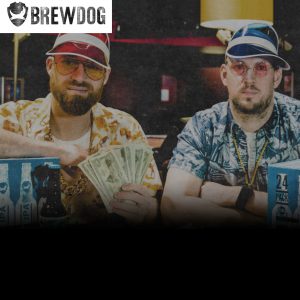
Less than one week after BrewDog founders James Watt and Martin Dickie announced plans to gamble investors’ money at a roulette table, the Scottish craft beer entrepreneurs appear to have temporarily pulled the plug on the stunt.
“The powers that be don’t seem to like gambling as much as we do,” BrewDog wrote in a blog post on the brewery’s website. “We are in discussions regarding the future of BrewDog’s Big Bet. Stay tuned for further updates.”
Brewbound contacted BrewDog via email to clarify whether the company planned to officially cancel the Big Bet scheme or just reposition it, but brewery representatives did not respond as of press time.
BrewDog launched the Big Bet campaign on November 30 with its usual bravado, bluster and ballyhoo, announcing that the brewery’s founders would place a double-or-nothing bet of Equity for Punks USA investors’ money at a roulette table once its crowdfunding campaign wrapped up in February 2017.
“One spin, with potentially millions of dollars on the line,” Watt said in a press release during the Big Bet’s launch. “We win together, we lose together. This is investment for the mavericks and non-conformists, for whom impatience is a virtue. Bigger, faster, bolder. Double the risk, double the upside.”
BrewDog had set up the parameters for the Big Bet as follows: Investors who opted into the campaign before December 29 were asked to sign a waiver at BrewDogsBigBet.com, choose a “gamble share” and select either red or black. The color with the most votes would have been where Watt and Dickie stuck their bet.
If BrewDog had won, investors would have doubled their equity positions in the company. If BrewDog had lost, investors making the bet would have lost their original equity stakes, but kept perks earned at the donor level.
William J. Bernat, a partner at Nutter McClennen & Fish LLP, a Boston law firm, told Brewbound that there were “a lot of potential issues” with the Big Bet campaign.
“To me, it’s less of an equity crowdfunding plan than it is a sweepstakes,” Bernat said in a conversation before the Big Bet was halted. “Each state has separate laws governing lotteries, gambling, sweepstakes, and it’s a big undertaking to survey all of the states where your investors might be located.”
Of course, there’s the glaring issue that roulette isn’t legal in every state. So, if the Big Bet fell under the jurisdiction of the individual states in which each investor was located, it could have put BrewDog in a legal quagmire — similar to issues that daily fantasy sports companies like FanDuel and DraftKings have encountered.
Even though BrewDog had seemingly covered its legal bases with a 30-point list of contractual obligations and a waiver, BrewDog may not have been fully protected from a potential lawsuit, Bernat said
“We live in a litigious society,” Bernat said. “One of the big sort of unknowns about equity crowdfunding in general is, when you’re dealing with an unsophisticated class of investor, there’s more risk in taking money from those folks than your traditional, accredited investors.”
Those kinds of backers, he said, aren’t typically aware of all the risks associated with investing, and perhaps more litigious as a result.
“So who’s to say that — not withstanding that they’ve signed away all of their rights or they’ve agreed to all of these disclaimers — that somebody who has lost in the game of roulette isn’t going to come back and file a claim against the company, for one reason or another.”

A company issuing shares is also required to make certain disclosures to the U.S. Securities and Exchange Commission, Bernat said, and it’s unclear what disclosures were made by BrewDog.
“It seems like they’re really toeing the line,” Bernat said of the Big Bet. “It’s not a bad thing. It’s certainly a way to get noticed, to drum up interest in the brewery.”
Another potential issue for BrewDog, Bernat explained, was the matter of voting shares allocated to each investor choosing red or black. No matter how many shares of BrewDog stock an investor owned, that investor only received one vote for either red or black. So, investors with a larger stake in the company would not have had a larger say in the bet.
In August, BrewDog launched the $50 million campaign to help pay for its 110,000 sq. ft. facility in Columbus, Ohio, now slated to open in 2017. The company is also planning to open a separate brewpub in 2018. After raising $1 million during the first three days, BrewDog has secured just $3 million of its $50 million goal, according to a press release issued last month.
With a minimum investment of $95, investors receive equity in BrewDog and a piece of its U.S. distribution.
Also last week, BrewDog announced that it would open a brewpub in any American city where at least 500 people invest in the company’s Equity for Punks USA crowdfunding campaign.
